Theatre Reviews
15 MINUTE THEATRE - Storybag Theatre
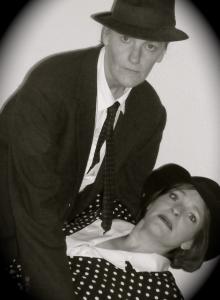
What a shame that there were only 8 of us to see this opening offering from Storybag theatre. You missed a treat.
Alison Benefield has created and directed a lovely vignette capturing the salient points of Brief Encounter and Casablanca, and giving a new slant on a quintessentially British soap opera, The Archers. She is no mean actress either.
The 'Silent folk in a dramatic setting' cleverly and humourisly pulled together all the aspects of the early silent movies, much to the consternation of the players! The Archers is a radio play. Silence does not work well on the radio. There is a 'villain', a 'damsel in distress' and a 'hero' wonderfully played with tongue in cheek.
The adaptation of Brief Encounter takes out all those long silences and meaningful looks without taking out all those long silences and meaningful looks - much better version than the original.
Having never seen Casablanca in one hit I never really got to grips with the story - thanks to Storybag Theatre I now know the story and don't need to see the film!
Stuart Rooker, Anni Tosh and Fran Larkin played their parts superbly - of course they all played more than one part which is tricky, even more tricky if two of the parts you are playing are in the same scene, very clever!
This is a fast paced, funny offering, with simple but imaginative set, sound track, costume and props - thank you to all concerned.
Give yourself a treat and see the next performance.
Linda McAlinden
A MIDSUMMER NIGHT'S DREAM IN POOLE'S CAVERN - Butterfly

After their success with last year's Macbeth in Poole's Cavern, Butterfly have brought one of Shakespeare's most popular comedies to the same venue.
If at first it seems a little strange to play a midsummer comedy underground, it's actually entirely appropriate. All the mayhem visited upon the lovers and the rude mechanicals happens outside the city in a place full of fairy mischief, and where better to represent that than the other-worldly atmosphere of Poole's Cavern.
The play starts swiftly with the opening scene told in report by a giddy Flute (Edward Hulme) as the rude mechanicals act as tour guides ready to show us round the cavern in this promenade performance. The pace doesn't drop as we enter the cave and the lovers, played as highly strung teenagers, fall in and out of love, with help from the meddling fairies.
The busy cast - the lovers double as the rude mechanicals - make the most of the fantastic surroundings and attack the performance with verve, whilst the fairies appear ethereally lit out of the darkness, as atmospheric singing in the distance enhanced the sense of a dream world.
It is wonderful ensemble playing and the director, Aileen Gonsalves, and cast have done superbly well to make so much of the environment. Of course, it's invidious to pick out individuals but I loved Hayley Cusick as a magnificently stroppy Helena, and John Sandberg as a manic Quince trying to organise the "cavern tour", rehearse the players, and double as Demetrius.
Thanks to the amount of rain recently, on occasion the noise of the water rushing through the cavern threatens to drown out the actors, and it gets a bit shouty, but that quite suits the teenage lovers anyway! And it's quite a relief that no-one sprains an ankle as they leap around in the dark and slippery conditions.
Butterfly's Dream is high energy, bags of fun, fairy magic and I smiled from beginning to end.
Steve Walker
Performances are in Poole's Cavern, thrice-nightly at 5:30, 7:00 and 8:30 on 4th - 8th and 10th - 13th July
AFTERWORDS - Organised Chaos Productions
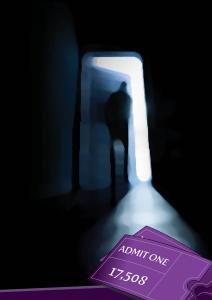
It is a question which has been asked for thousands of years - what happens when you die? Now for many there is an afterlife, but what is it like exactly? Well, Organised Chaos and writer Michael Hart have come up with a novel take on this old chestnut.
Afterwords tells the story of the death of Julie Baxter and her attempt to be reunited with her husband Derek in the afterlife. Not in itself unusual or dramatic you might think. However, 'the afterlife' and 'The Big Man' have a few surprises in store for Julie, not the least of which is the conceit that your physical appearance in the afterlife is based on the age when you were happiest when you were alive. There's always a catch isn't there.
This opens up a range of possibilities to be explored and this piece does so admirably. The opportunities for humour are grabbed with both hands and there are some really good one-liners in here and some nicely observed touches of the frustrations of dealing with bureaucracy. Humour, however, is not what this work is about and it is ultimately a bittersweet tale of love, loss and resignation.
The acting is good and the direction is sharp. It is a confidently written and performed work which shows the whole ensemble at their best I think. Looking for an enjoyable evening on the Fringe, then try this.
Ian Parker Heath
ALICE - Function Factory Theatre
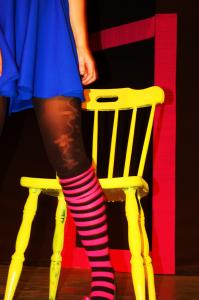
Function Factory Theatre is a Lancashire based company and makes a point of presenting new writing. 'Alice' is by Natalie Hickman and it was well received at the Liverpool Write Now festival earlier this year.
'Alice' takes the looking glass idea as its starting point - and to the extent that questions such as 'What do we know?' and 'How do we know it?' are addressed in the writing then the links with Carroll are obvious enough.
In this case Alice (Gillian Thompson) is a 20-something Liverpudlian who is "completely failing at life" and "constantly waiting for something to happen." Others around her have homes, jobs and family - all she seems to have is a pair of expensive shoes, bought on the internet, that aren't terribly comfortable. Despite all of this she tries to tell herself that she is "truly happy" on her own.
Alice may well be one of those young people mis-sold a university education - told it is a gateway only to find it is a road to nowhere. She wears her learning lightly but is given to quirky thoughts. At one point, for example, she wonders if our feet and toes define our personality - and does the goose-step tell us all we need to know about the Nazis? (Feet and shoes are a recurring image).
Then Edmund (Chris Garton) - a travelling salesman - mysteriously comes into her life. His dress suggests that he is from the past - though his use of "no probs" at one point may imply otherwise. He variously teases, encourages and bullies Alice trying to get her to face up to "What are you running away from?" Essentially he tells Alice to take responsibility for her own life - a message he presents by asking Alice to "sell" him her shoes, that is to explain what is unique and interesting about her footwear. This scene is the most engaging part of the play.
This may make 'Alice' seem hard going but there is brightness and energy in the writing and playing, and the philosophy is presented with a contemporary humour. Alice is a genuinely likeable young woman - and you wish her well. She will, you feel, need more friends in life as she tries to smash her way out of the prisons of modern urban existence - she won't succeed on her own.
Keith Savage
BED AMONG THE LENTILS by Alan Bennett - library theatre touring company

Alan Bennet's Talking Heads are ideal for the Fringe. They require no scenery and just a few props. Bed amongst the lentils is one of the best of them. And Library Theatre cleverly used lighting to divide the monologue into short scenes which helped to create the feeling of time passing.
It is essentially a sad story whose poignancy was admirably caught by Deborah Kelly's carefully understated performance. This really suited the tragi- comedic circumstances of the alcoholic vicar's wife who consumes all the parish's communion wine and has an affair with an Indian grocer. Bennet asks almost naïve questions. Why doesn't Jesus smile? Why should the vicar's wife be expected to have the same religious conviction as the vicar? And, more importantly, does the vicar actually believe in God? Bennet does not attempt to answer any of these questions but leaves us to ponder them.
This thought provoking work is apparently used to give students in theological colleges a dreadful warning of what can happen to a parish priest. But it is first class entertainment as well. The production is definitely recommended.
Peter Low.
There are more performances on 14 and 20 July at 7.30 at the United Reformed Church hall at 7.30 pm.
BOBBY - Just Add Water Theatre Company
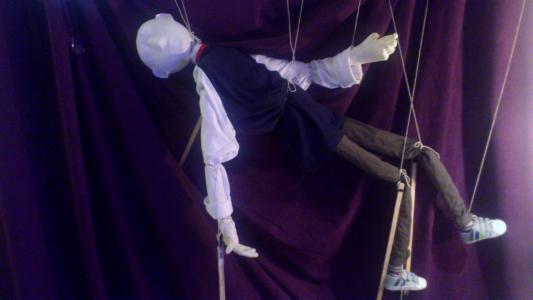
I was so excited to not only be watching this innovative physical theatre company, but also to be reviewing their new show. I have been following their online blogs with much interest, watching the development of the puppet and the action devised by the team of young actors.
It starts in The Paupers Pit with 4 actors, all in black, sitting frozen on the stage, suitcases framing the sides of the set, overflowing with potential. I was totally enthralled from beginning, where Lego was used to explain how the many inner parts of the body are made, to the finish, swept along by faultless ensemble performances and an outstanding use of props. No one who sees the show will ever forget Grandmother or the perfectly timed news report!
It was Bobby's story, the story of a boy who was treated so badly as a child his that his inner self put up all the barriers it thought would protect him. The four actors played the roles of the inner self with Free Will questioning decisions, provoking Desire and trying to bring Hope back to life. However the dark figure of Fear wanted Bobby to protect himself by rejecting offers of kindness. The cast were true ensemble players who physicalised with stunning slickness the workings of the inner emotions. There were many moments of comedy in this dark fairy tale, from the arguing Mother and Grandmother, even Grand father's death was played in a way that made the audience chuckle!
Bobby himself was a featureless puppet, for whom the audience felt intense sympathy. He was gentle, mistreated and had no understanding of how to be around people. The tender handling of Bobby by the performers described a poignant figure that almost seemed too fragile for this world.
The story could be complex and hard work to watch, however in the skilful hands of Just Add Water, Bobby's tale flowed like the adrenaline that pulsed through Bobby's body. The soundtrack of the show helped with this fluidity. Repeated choral movement reinforced how the separate parts of the inner body worked together.
I cannot recommend this show too highly, it is entertaining, thought provoking and I have never before wanted to give a puppet a hug and tell him it would all be alright...but this is that show! Anyone who is put off seeing a physical theatre show through Fear of it being pretentious and hard work should come to see this performance; Preconception will be pushed into a dark corner by Enjoyment.
10th July 10.30-11.30pm and 11th&15th July 9-10pm at Underground Venues.
Jayne Marling
BOTTLED WASPS - Organised Chaos Productions
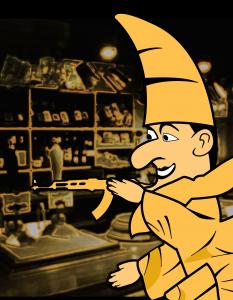
Grace and Patrick return to the scene of their passionate elopement to try and recapture lost feelings as their relationship is showing cracks.
They arrive and are met by Walter, "mine host", who clearly does not see them as welcome guests and so begins the dance between the threesome as the couples' efforts to rekindle the fire are sidelined by Walter's manic ramblings and intense railing against his past failings, tragic incidents and personal weaknesses.
Walter presents an expletive laden, garrulous tortured soul whose only point of stability appears to be in his relationship with Mr Punch and Judy, leftovers from his former career and his sole comfort.
Grace and Patrick get caught up in Walter's rolling snowball of anxiety that reveal unseen sides to Grace and Patrick that have significant impacts as the denouement builds.
The performances from Marie Westcott, as Grace, was indeed graceful, calm for the most part and beautifully cutting. Hayden Thomas, as Patrick, showed part exasperation, part Les Mis enthusiast, eventually relishing an episode of intense taunting whilst the performance as a whole buzzed around James Dunn, as Walter, whose indefatigable energy spun the narrative around him.
Bottled Wasps presents an intense hour of entertainment.
Paul Harrison
CONTRACTIONS - Macclesfield Amateur Dramatic Society
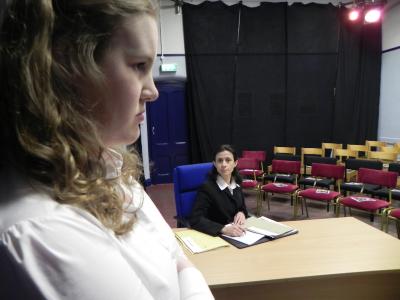
It might be worth saying at the outset that 'Contractions' is not directly about childbirth - though the birth of a baby is part of the story. No, 'Contractions' recounts the experiences of Emma over a period of about a year as she works in the sales department of a large company.
In 13 short, crisp scenes Emma's career develops through a series of interviews with her Human Relations (HR) manager. Now a close friend of mine routinely calls HR 'Human Remains' and insists that it is "the provisional wing of management." 'Contractions' would confirm that view.
I really don't want to say much about the story - I don't want to spoil it and I really would encourage you to see the play for yourself.
Am-Dram gets a lot of flak at times either for over-reaching itself or for playing safe - but this production by our friends from Macclesfield is amateur dramatics at its best. MADS has chosen a taut, witty and emotionally charged script that it is confident it understands and can deliver. We are presented with a contemporary play, provocative in the most constructive sense, which is well acted, directed and produced.
Sue Munro plays the nameless HR manager - and if she is something of a two-dimensional bitch, well that is intended as a compliment in this context. Catherine Rimmer has the more demanding role - in terms of emotional range - and she succeeds in turn of persuading us that she is confused, shocked, angry, hurt, alarmed and grateful.
The script is by Mike Bartlett - whose adaptation of 'Chariots of Fire' is currently at the Gielgud Theatre in London. 'Contractions' began life as a radio play, and that shows, but the intimacy of a small church hall provides a good setting for this confrontational story told across a desktop. The raised eyebrows and scowls of the characters are small, but meaningful, gestures that add depth and subtlety.
There are two more performances of 'Contractions' in Buxton - try to get to one of them.
Keith Savage
DEV'S ARMY by Stuart D Lee - Elysion Productions
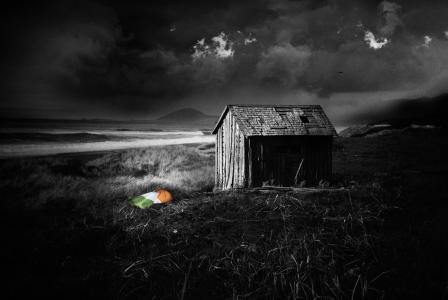
In this time of ever deeper rapprochement between Britain and Ireland, when the Queen has shaken the hand of Martin McGuinness, it's interesting to look back at a little known part of Ireland's history. Prime Minister Eamon De Valera ('Dev') kept Ireland neutral during the Second World War, and this play explores conflicting attitudes to neutrality through the soldiers of the Local Security Force (think Dad's Army) guarding the coast.
The old romantic Paddy (Richard Sails), like Dev, refers to the war as the "emergency", and claims he was in the 1916 rising in the GPO - "to buy a stamp" retorts Dermot (Matt Lanigan), the pragmatist who fought for Britain in the Great War. Paddy is happy to witness Britain's misfortune but Dermot believes Ireland has more to fear from the Nazis. Between them the hapless Father Dougal-like trainee Michael (Daniel McClelland) is the butt of the jokes, as they carry on patrolling the coast looking out for "funny business", either German or English, with a hopeless lack of resources.
This is a superbly written play and deservedly won the New Writing award at last year's Fringe, the comedy is sharp and the barbs come thick and fast - "what will you do for brains when the donkey wants his bollocks back? - delivered by a cast that works together perfectly. Amongst the black humour and the tale-telling, the issues are debated between the glories of the past and the needs of the future, without ever being didactic. The tone changes with the arrival of a stranger (Wayne Allsop) and as he manipulates the soldiers and plays on their prejudices it moves into darker territory.
Its impossible to fault this play, the performances from the four actors are all excellent, I have a soft spot for Sails' Paddy, though Lanigan's solid integrity as Dermot anchors the play. The attention to detail in the sound and the set is spot on - when they come in from the rain they are actually wet - without being overdone.
You won't see a better show at the Fringe, Dev's Army has a great script and wonderful performances, what more could you ask for?
Steve Walker
DO YOU STILL THROW SPEARS AT EACH OTHER? - Dotted Line Productions
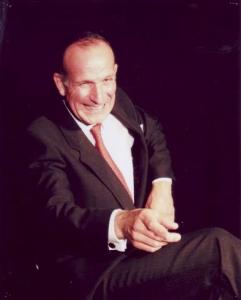
Gorge Telfer is well known for his brilliant one man shows about famous figures and Do You Still Throw Spears at Each other? is yet another outstanding character from his repertoire, expertly written by Stave Haythorne.
Performed to a sold out crowd in Underground Venue's Paupers pit we were met with the union flag and a chair. He entered, nose first, and the magic began.
This relevant piece follows the Duke of Edinburgh from birth, through school days and finally "standing in the London weather on a floating Chinese restaurant". Telfer's performance is flawless. Everything from the inane, wrinkled grin to the jerky hand movements is a subtle and accurate depiction of the serving spouse.
Telfer is totally at home with the audience and the scenes are punctuated by some meeting and greeting with the 'crowd'. When a shameful latecomer entered the auditorium, in true Phillip fashion he enquired "are you late for everything, or is it just this? I suppose you'll have to take this bloody chair next to me" which he then placed on stage before shooing the now mortified latecomer to the back.
There is also something deeper about Telfer's performance and Haythorne's text surfaces a lonely and vulnerable side to United Kingdom's longest-serving consort.
The press or "bloody reptiles" (off stage left) are consistently referred to and are a constant presence throughout giving us some insight into the level at which the Duke of Edinburgh is plagued by the paparazzi - catching his every slip up and derogatory comment.
There are also plenty of jolly good Royal gags, most notably "I have always loved my grandchildren. It's just their parents that do weird things" mixed in with some classic Phillip Quotes such as "If you stay here much longer, you'll go slit-eyed"
Haythorne's writing is comic, touching and well structured. For a brief history of the Royals it is remarkably dramatic, with both humour and sadness that resonated on so many levels with the packed house that watched it. One of the reasons for this is that Haythorne's Phillip speaks so candidly about issues suspected affairs, Diana and Charles and his life as a husband. The show is sympathetic to the "cantankerous old sod" and the comments that we have read in the newspapers that at the time we saw as off-colour or weird were often funny when retold in Haythorne's/Telfer's voice.
What a privilege it is to watch such an informative and insightful piece of theatre. One liked it very much. One recommends.
Sian Dudley
EARNEST - Korpse Kustard Theatre Company
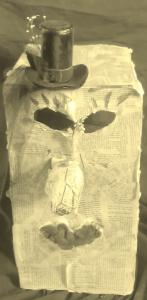
Korpse Kustard's first production was Dead Earnest, a three man version of The Importance of Being Earnest. They're obviously keen on the play, and this time they've gone one better by cutting the cast to two.
92 years old and confused, Gwendolen recalls her youth in the company of her carer - and can't work, won't work Vicky has only taken the "opportunity" rather than lose her benefits. It's a very contrasting comedy of manners to the original, though unfortunately Gwendolen isn't alert enough to her surroundings to make the most of the culture clash with Vicky. The establishment of the characters at the start is well-achieved with some spirit, particularly in the case of the feckless Vicky and her lecture from the job centre.
The Importance of Being Earnest is a great play, and the audience was treated to some of the classic scenes - "A Handbag?" - with some interesting use of physical theatre with props and puppetry to bring Jack, Algy and the indomitable Lady Bracknell to life.
Whilst the extracts from the original Earnest were great, and some of the physical theatre used is well-executed - I liked the illustration of Gwendolen aging - I wasn't sure what this angle added to the original. By going to the trouble of portraying her as a frail old lady, it would have been nice to get her perspective on the 20th Century having started in an Oscar Wilde play! I left wondering what had happened in the intervening years, how she'd come to be looked after by Vicky.
Steve Walker
EINSTEIN'S DAUGHTER by Rob Johnston - Freerange Theatre Company

The past is locked in a room. The only trouble is the past is breaking out.
In the upstairs of the Old Club House Einstein's Daughter is set against a carefully placed table, two chairs and a solitary dog bowl.
The show begins with father Andrew (Hugo Chandor) about to leave his daughter Maggie (Emma Parker) for a business trip. Pretty quickly we realise that Maggie can't form her own opinions and looks to her father for every answer, demonstrated in the agony when Andrew asks Maggie to choose a tie for him to wear. Whilst Andrew is away, old friend Cath (Amy Spencer) arrives snapping Maggie out of routine and taking her back 10 years to a time of freedom and discovery. It is not until Andrew returns that the true consequences of this unexpected guest are felt, leading to a series of disturbing revelations and sinister events.
Einstein's daughter is a great example of fantastic new writing. Johnston creates terrifying yet subtle theatre with unsettling characters, carefully woven into an atmosphere of repression and control. This is not to say the play is without humour. There are some perfectly placed colourful language and some brilliant quick fire one liners.
I do however feel the show could have benefited from more careful sound design. The lighting was also a little garish and could have been softened and more subtly timed.
Praise should be given to cast of three, who were all superb! Candor with his glaring intensity made the perfect villain. Spencer provided in Cath Andrew's perfect antithesis, her performance was liberating, wild and brilliantly funny. A special mention must be made to Emma Parker for her intriguing portrayal of Maggie. Although the character took a little while to get used to, she sustained obsessive submissive tension, whilst offering glimmers of character and rebellion.
This show is the quickest hour and forty five minutes of theatre I have ever experienced - I was gripped from start to finish. This is the kind of story that lingers with you long after the performance is over. I think this is a Fringe must see!
Sian Dudley
END TO END - The Gramophones Theatre Company

Very often we find the most moving and captivating tales are the ones that come from real events, happening to ordinary people, about everyday life and this is what makes End to End, the story of three women's inspiring and often daring journey from one end of Great Britain to the other truly sensational! Taking advantage of their freedom at a stage in their lives when so many of their friends had decided to settle down and in the hope of waking up their spirit of adventure, it's an exceptional and inspiring journey of trust, risks and chance encounters.
Ria Ashcroft, Kristy Guest and Hannah Stone promise to take us along with them on their unique journey, from Land's End to John O'Groats, sharing in their experiences, meeting a whole host of interesting and unusual characters, " feeling every bump in the road" and this is exactly what they succeed in doing.
The journey begins with prompt audience interaction, from being asked to think of something that feels like home (which is cleverly interwoven into the narrative later), having our height recorded on a sign post,(a fitting tribute to a memorable story), to the touching task of carrying and passing on their bottle of hopes and dreams for the journey ahead.
At a racy pace we are introduced to the varied and often unusual modes of transport they use along the way, including one very moving moment on a micro light, when the clever use of simple props and projection made me feel like I was soaring through the clouds high in the sky with them! Maps are used to plot the journey, giving us a sense of speed and urgency as the days are passing by and the end is in sight. The music, which played out from their gramophone, was soft and subtle and created the perfect atmosphere to accompany each stage of the journey. A special mention must be made to the beautiful song they play at the end of their performance, something lovely they had collected along the way!
Throughout the performance the audience share their highs and lows, as we begin to feel the tiny seeds of their journey beginning to find fertile ground, to more sinister moments such as meeting some rather unsavoury characters. On more than one occasion, there are deeply emotional moments as memories and special people who have shown them kindness are remembered with fondness. There is also an interactive intimate audience moment, involving cuddling the most delightfully smelling cushion, which is not to be missed. At one particular point I felt a real sense of the danger they encountered when, defying the perceived risks, they decided to hitch-hike. This scene, like many others throughout the piece, was brought to life with a real sense of energy and vibrancy, simple but effective little props adding perfectly to the overall effect.
There are also many moments where comedy is cleverly interwoven into the journey and the tone and pace of the whole piece was pitched perfectly to accompany this emotional journey. Their impressions of some of the characters they met were skilfully portrayed and cleverly depicted, but I would have liked to have seen a little more of this comical characterisation, brought to life with regional accents.
The performance comes to an end in a very touching and moving way, (some of you may need to pop some tissues into your pockets, just in case you're anything like me) and what is clear is that although the young women have shared a journey of a lifetime, met many wonderful people and collected many interesting unusual and quirky stories along the way, they clearly missed the people that know them best. The message is clear, there really is no place like home!
Joanne Eltringham
EXCUSE ME, I'M TRYING TO PLEASE YOU - Fiona Paul Enterprises

Joyce Grenfell: a tough act to follow. Taking the great Ms Grenfell as a leaping off point Fiona Paul has produced a splendid show, as the great lady herself might have said.
The influence is clear from the outset, but that is where it stays. We were treated to a show full of diverse characters from around the nation. From the world of am-dram to the Essex girl and on to old-school teacher with a cure for depression, each of her characters was recognizable and smartly portrayed. There seemed to be no group immune to her sharp eye. The world of WI also took a hit as the tensions within the realm of cake judging came under close scrutiny, with hilarious results.
The show is thoughtful, well-crafted and well performed. The running tale of the lost handbag and its contents works well. I have a friend with a stalker called Rosemary. Are all Rosemary's stalker I wonder?
From being greeted at the door by the star of the show offering Jaffa cakes to the rousing bubble-blowing, tooting, popper-laden finale, this was an excellent show and I can see why it is a sell-out. Get there early and prepare to be pleasured!
Ian Parker Heath
FORWARDS AND BACKWARDS - Square Peg Theatre

This two-handed piece of physical storytelling manages to cover so much emotional ground as the fragile lives of a young couple are played out fast and slick; the piece manages to cram so much energy and subtlety into one hour that you come out trying to remember the fine details as the scene cross cut with sharp movement, flashbacks and elliptical montage. The premise is simple and human: we witness the first tender meeting of two people with contrasting interests- he's the smart ambitious business man, recently graduated and looking for promotion; she's the vegetarian political activist, both at each end of the social spectrum, united by inescapable love for each other. The physicality is graceful, elegant and fluid in its choreography, never feeling forced or unnecessary, the two actors finding symmetry and space between each other's body to create still tableaux and tender moments, whether squashed inside a train toilet to escape the fare, or dealing with the humdrum activities of sharing a bathroom. The dialogue is clever and economical too- some beautiful word play for choosing cereals, (the Alan 'Sugar' puffs). However, as the cracks start to appear in their relationship, the infidelity emerges, gradually heard through secret phone calls, clandestine meetings and the pretence of 'staying at my sisters for the weekend'....
The narrative builds to an inevitable climax as it juxtaposes the illicit affairs with forgiveness and tragedy for both characters. As in life, things rarely turn out the way we want them to, we struggle to find the satisfactory conclusions to our relationships. In this case, the piece comes full circle to their first tender meeting as the journey could begin all over again, but would they do anything different this time? Would you? Both performers invest 100% commitment to the piece and reveal a depth of emotional intensity in such a small space that gets right to the heart of this contemporary relationship and leaves the audience with nothing but admiration for their efforts. Be inspired to catch it again on the 6th, 16th and 18th July in the Paupers Pit.
Jason Hudson
GRIMM TALES by Carol Ann Duffy - Almost Famous
The poet laureate, Carol Ann Duffy, comes to the Buxton Fringe in the form of her adaptation of Grimm Tales performed here by Almost Famous.
The scene is a struggling nightclub in thirties Germany, and the suave host is under pressure with a cast of inept understudies and the Nazis breathing down his neck. The show must go on, and he introduces the evening's entertainment of four of the Brothers Grimm's most famous tales; Rumplestiltskin, Hansel and Gretel, Little Red Cap and Ashputtel (that's Cinderella for the Disney generation).
The stories are full of classic fairytale archetypes - sinister sprites, odious kings, dashing princes, innocent girls, loving but useless fathers and evil step-mothers - all played with enthusiasm and gusto. The pick of the stories is Little Red Cap, a cheeky minx confronted by a lusty Cockney geezer wolf played with enormous relish. In this tale, the performances live up to Duffy's witty and earthy text.
In Hansel and Gretel, there are some nice touches as they try to appease their Nazi persecutor with blatant and clumsy nods to Hitler. However, in the other tales the link to thirties Germany is hard to find other than the accents - which are lost to the benefit of Little Red Cap - and at times the same characters seem to be turning up in varying guises in the different tales, though they are great rambunctious fun.
There is much to enjoy, in the increasingly frustrated host, teutonic shouting, and a great finish, which you'll just have to experience yourself...
Steve Walker
Grimm Tales continues in Underground Venues on 9th July at 10:15pm, 13th July at 9pm, and 17th July at 4:30pm
HOW TO RELAX IN ANDALUCIA - Casagua
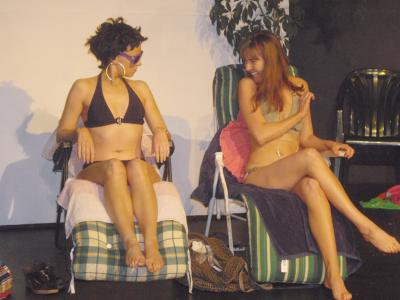
Like a late night episode of Eldorado, the sparseness of the set and story - revolving as it did around the difficulties of trying to get some peace and quiet in a sleepy Spanish village for uptight Englishman Peter - also reflects the limp narrative structure. Peter's peace is interrupted every 5 minutes by the appearance of each lightly sketched character. The arrival of posh girl-with-a-secret Carol lifts the action (clear vocal diction from Rebecca Fenwick). I'm sure there's an intriguing story somewhere, but this seems to rely largely on European clichés and stereotypes; the Cockney gangsters moll, the loud Aussie backpacker ('strewth mate!), the repressed Englishman, the Hippy Dutch girl. The result being that most dramatic truth is squeezed out with untimely pauses and dubious jokes (the double-dutch gag) which hinders the pace.
There's a whiff of old fashioned sexist comedy in the scene where the two men are 'playing cards for women' that might be pointing to its target audience. The one-dimensional Aussie backpacker played by Chris Paviou (G'day mate!) seems superfluous to the plot. This could also have been more sharply directed with quicker entrances and exits to reflect the build-up of drama.
There are one or two competent performances struggling with a flimsy plot; notably Nicole Gaskell as Dutch girl Saskia who manages to suggest there might be more to bring to her character and Karl Seth (good comic timing as put upon Peter). There are moments of farce and one bit of 'carry-on' comedy in a scene where everyone pretends to trip over each other. This play would appeal to a more mature audience who prefer their comedies to be gentle on the ear. The 'twist' with the cockney gangster appeared from such a long way it could be heard warming up backstage.
It's no fault of the actors when the writing lets them down, they keep the action flowing, plough on and make the most of some of the comic situations. If you're looking for some warm Andalucian sun to brighten up a wet July, you may have to look a bit harder. However, like a light Spanish Omelette, there's probably enough to entertain its target audience as a starter, but left me wanting more for the main course.
Jason Hudson
On again Tuesday 17th July at 7.45pm
I WANT TO HOLD YOUR HAND by Claire Spratt - Planet Rabbit Productions

The theatre company that brought you 'Blitz Bride' present a delightful snapshot of life in 1963: Beatles, budgies and bunions.
Entering the United Reform Church to see 'I Want to Hold Your Hand' by Planet Rabbit audiences are quickly welcomed into a classic 'swinging 60s' abode, the care and attention to detail taken with set being immediately clear Lloyd loom chairs, an iconic wooden deer, and, of course, the Beatles poster create an immediate engagement with the character and- often yellow and orange-pattern of the family home.
It's clear then that the cast have to be similarly authentic and engaging. They don't disappoint. The only thing more vivid than the garish, vintage patterns is the 'Helter Skelter' of characters created by writer Claire Spratt and based on the real life anecdotes of Jean Butler and Annie Harahan. It's this feeling of 'real life' that gives 'Hold Your Hand' such a charming and, often touching, glow. From the moment Sylviann (played wonderfully companionably by Charlotte Mayer) greets the audience and begins to tell her story you don't feel as though you are watching a play as much as eavesdropping on the various corners and calamities of the flat above her parents' chiropodists' shop. The dialogue is persistently witty and often laugh-out-loud funny without appearing 'staged' and it's inevitable that everyone will find something timeless to empathise with whether its neighbourhood gossip over cups of tea, gushing over boys, catching a budgie or, the more exotic, shimmying up a drain pipe into your friend's room when it's very nearly her bedtime.
The latter is the domain of Pamela (Sarah Kearsley finding just the right balance of confidence and restraint in a role which could have been a little overpowering) Sylviann's 'exotic' new friend from London whose family arouse the suspicions of her mother Ruby and gran Peggy (Gayle Dennis and Ann Ridley respectively in a hilarious pair that will always leave you wanting more). The moment they reveal their wild theories about Pamela's parents has a real spark; it's one of the funniest moments of the play and a real highlight.
It's undeniable that Planet Rabbit have their very own 'Fab Four' here and, even if it weren't so, I can't stress enough that 'Hold your Hand' is worth seeing just for the characters of Barry and The Girl Guides with Barry in particular making an entrance nobody will forget in a hurry.
Sylviann's climactic trip to a Beatles concert is an absolute delight; Meyers' portrayal of teenage excitement is electric, infectious and extremely accurate whilst audiences experience the Beatles like they've never seen them before. This is soon followed by a sudden tender, serious moment (Dennis' performance is wonderfully moving here, and powerful commanding complete attention despite a, potentially very distracting, Valerie in the background). Mignon McLaughlin said that "people find it hard to be both comic and serious though life (and I can now add Planet Rabbit) manages it easily enough". This shade of sadness to balance out all the fun and games makes a wonderful ending to the play; it's executed brilliantly and, whilst being brief, is also incredibly touching reminding us that yesterday all our troubles didn't seem so far away after all.
Following this Sylviann's closing 'goodbye' may seem a little abrupt but that's a testament to how absorbed audiences become in this lovely story and extraordinary, everyday family. Faultlessly professional set changes and confidence and mastery with props mean that you're inclined to forget you're watching a play. Consequently you don't expect it to end and, I for one, didn't want it too either. Absolutely brilliant and well worth another 'Best Production' nomination for Planet Rabbit.
Performances are at United Reformed Church - Green Room: Hall. 7, 11, 18 Jul 7:30pm to 8:50pm, 21 Jul 3:30pm to 4:50pm, 7:30pm to 8:50pm £7.50 (Child and Conc £6.50)
Bookings via planetrabbitoffice@gmail.com or 07986 122300
Lilly Posnett.
IMPERFECT CADENCE - Genieoutthebottle
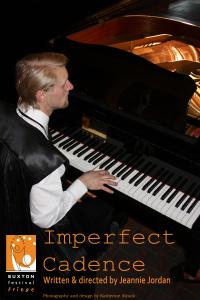
Written and directed by Jeannie Jordan, a cast of four with a minimal set.
An 'imperfect cadence' is a harmony which introduces a tension which listeners then expect to be resolved by a later perfect cadence.
The blurb in the programme talks of a retiring headmaster, Michael O'Rourke - instead, read, retiring headmistress, Michelle O'Rourke. (You should also know that the duration of the play is less than 30 minutes).
The opening scene establishes the main setting. We are the audience at the Northfield Music College of a concert performance conducted by the headmistress. A young student, Liam, sits scoffing and there is a special guest, ex-student Sophie Stringer, now a successful actress and her mother.
All four of the cast worked very hard and were convincing, particularly Kyle Lowley, who was required to switch characters throughout the play. The personalities were very present on the stage, understood and empathised with.
The problem I had was the structure of the performance. The transition between the past and present wasn't clear and was additionally confused by the character change of Liam to Grandfather to Journalist and back again.
But, I did, eventually manage to read the transition cues but then the lights went down, came up again, and the cast was bowing.
It was only when I got home that I was able to take in the story. It was then that I fully understood and began to appreciate the script: At first we see the nurturing relationship between teacher and pupil, between parent and child, and then we realise that this is not selflessness but an opportunity for parent/teacher to realise their own lost dreams.
It was a real shame to see such promising performances together with an interesting script, so poorly structured.
Martin Wood
KAFKA IN THE SINK by Gavin Crippin - A Rebours Theatre Company

Kick starting an early evening first day of the Buxton 2012 fringe can always be a daunting prospect, the time before things really get going and audiences are small; however, this piece of new writing from Manchester based writer Gavin Crippin moves quickly from one scene into the next with pace and energy. The play focuses on social care worker Shelley (a well cast Eve Burley) as she struggles with bureaucracy and pen pushers to get the best for her trio of clients to integrate into Cameron's 'Big Society'. These are the marginalised lost souls who find everyday activities challenging. The neglected people whose existence relies on state benefits and cheap wine; in a dog eat dog community there will always be those begging for a hand out and Emma (a feisty Geraldine Sharrock) feels the strain as she struggle to keep her life on track with the more emotionally draining job of getting more access to her son- taken away as a result of her addiction to the booze. As a writer, one of the concerns when dealing with these elements of society is the risk of creating 'archetypes' rather than truth; thankfully this piece stays just the right side and reveals genuine emotional engagement through the characters fairly dull lives - reminiscent of a Ken Loach or Mike Leigh film -the agony of Colin's despair when he realises the job he got at Argos is non-existent, just a government scheme to manipulate the employment figures and get him off the benefit list. Additionally, the trauma suffered by Eddie (an intense Matthew Hattersley) struggling with mental health issues when confronted by brick throwing youths who threaten his daily peace. I'm not sure the masked figures lend anything directly to the play as they appear sporadically in between scenes, but the piece moves at just the right pace to keep your attention. Good comic timing and delivery from Paul Irwin results in a naturalistic performance as he and the hapless Eddie find solace in their passion for Rugby and dominoes. But the bureaucrats close in on them and threaten to uproot their lives once again.
Who is to blame? Shouldn't these people on the fringes of society take responsibility for their actions? Why should Emma be capable of looking after her child when she can't get through the day without a bottle of Merlot? Is it left to the tireless work that people like Shelley do to pick up the pieces of lives shattered by this false notion of a 'caring community', broken by the ineffective system. The play offers no real answers but does hint at some kind of cathartic release for the characters; but I wonder how many cases slip though the net and leave them abandoned without hope? However, it's satisfying to see original work and this is a good solid and fluid piece of new writing. If you like your theatre edgy and political, get to see this while it's here at the fringe.
Jason Hudson
MUGGED - Shadow Syndicate
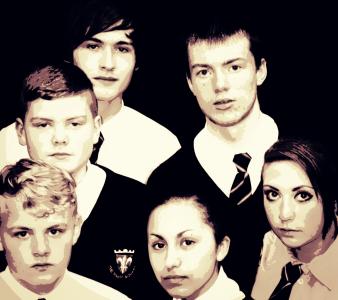
Andrew Payne's powerful play, Mugged, is the perfect vehicle for this group of young actors, all aged between 14 and 15.
Marky and Dig, played by Kaylum Vella and Ellis Gregory, are friends who spend much of their time hanging out on benches in the park. They are also part of a wider group including a couple of wannabe bullies and two girls, Soph and Mel, who do little to discourage their intimidating behaviour. In this environment, banter quickly turns sour and it is routine for Marky and Dig to have to turn out their pockets or put up with a swift beating from their so-called friends, Taylor and Leon.
The wider world is scarier still however and every day the kids make a calculated decision whether to take a dangerous shortcut to school and risk encountering muggers or take a longer route and be late. When Soph takes the shortcut and has her mum's phone stolen, she is desperate to get it back but the intervention of one of her friends has tragic consequences.
It would be a shame to say too much more about the plot as the cast builds up the tension admirably but the play deals effectively with the repercussions of the incident showing how difficult it is for anyone to 'tell the truth' about what happened. Adults and children alike find their accounts clouded by expediency and myths about gang warfare are perpetuated, with the victim at various times demonised and lionised according to whose 'truth' is being peddled at the time.
It is a very thought-provoking play, effectively staged and well acted by a cast with no standouts but no weak links either. They all exhibit a talent for naturalistic acting and have an easiness with each other that makes the peer group believable. A little more voice projection would have been nice and there were one or two occasions when actors could have avoided standing with their backs to the audience, but these are minor quibbles.
Shadow Syndicate, made up of drama students from the Manor Academy in Mansfield Woodhouse, are familiar performers at the Fringe having picked up two Fringe awards last year. Well worth catching, they are offering two productions for 2012, Mugged, featuring some of the youngest actors they have ever brought to the Fringe, and Nine, about kidnapped journalists in Syria.
It is interesting to see from their programme notes that the students take full advantage of the Fringe, spending five days here and taking in other shows as well, no doubt finding further inspiration for new and exciting shows in the future.
Stephanie Billen
NINE - Shadow Syndicate
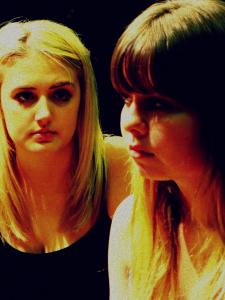
Shadow Syndicate's 'Nine' couldn't feel fresher, with its exploration of the current Syrian conflict lending a streak of individualism to the recent news reports on the region. Also refreshing is its unfamiliar focus: the play avoids the exhaustively-covered cities of Homs and Damascus, instead taking us down into uncharted cellars, where British journalists lie captive.
As I entered the Orchestra Pit, I felt immediately uncomfortable. A dark stage, void of any decoration, loomed with all the reassurance of a lone magpie, perched on a wedding cake. Acting to heighten the ominous atmosphere, Laura Turner and Jessica Millott held (for an extraordinarily long time) frozen postures of resignation as we became seated.
And the tension only mounted. Both actresses displayed remarkable characterisation in their raw presentation of the effects that torture can have. Their depiction of the psychological and physical traumas suffered by captives in Syria was performed to such a convincing degree that I was left recoiling in horror.
Fuelled by the human instinct of self-preservation, each battled with the internal dichotomy of friendship versus independence, as demonstrated by the deceptively-harsh, rehearsed words of concern used by each to assess the physical harm suffered by the other: 'Show me your hand...wriggle...bend.' Yet in spite of this need for companionship, it was disturbingly easy to empathise with the concept of sacrificing another to save oneself; it is testament to the ability of both actresses that they were able to draw such repulsive and suppressed notions from their audience, such that would only truly manifest under the strain of torture.
The theatre was utilised to its greatest potential, juxtaposing a clamouring claustrophobia (induced by the dim lighting and tight performance space) with the concept of sanctuary (created by the horrific sound effects which came from the outside world.) Not only were the characters desperate to get out, they were also desperate to remain in their chains, with the alternative being torture. Thus, the audience was kept in an impossible state of fraught discomfort; an astounding feat, considering the entire play rested on only two actresses. And so, for several minutes after 'Nine' had drawn to a close, the audience remained silently stationary, contemplating what they had just witnessed.
Although it is needless to highlight the ages of Turner and Millott, I shall do so for precisely that reason. Reviewers of youth productions habitually comment on how remarkable young performers are... 'for their age.' Yet, in this case, both actresses (aged 17) performed to such a high level that they were simply remarkable, full stop.
Freya Palmer
OFF HER FACEBOOK! - Facing Tides Theatre
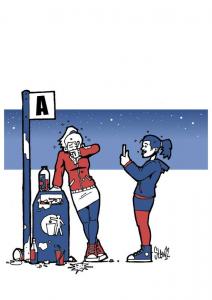
Despite having the name in the title, this drama has nothing to do with Facebook although it does target the Facebook generation. The company specialises in educational theatre and this short play was originally devised as a platform for highlighting the perils of alcohol for teenagers.
Laura Jasper and James Paterson take all four roles in this glimpse into to troubled relationships within a single family blighted by alcohol. The key features of alcoholism are laid bare as are some of its consequences. One aspect of note is how alcohol is used by others to cope with the alcoholism of a family member.
I'm not sure about the venue for a piece such as this given the theme. Almost all the audience sat watching this with an alcoholic drink in their hand, in a bar. Was this intentional irony? I don't know. Similarly, the bar remained open to the public, who could see the play for free. There were minor distractions such as the telephone ringing, drunken revellers walking past the venue, but again, was this intended by the production company?
The piece is short and succinct, as intended for its original audience, so don't expect long, tense dramatic interplay. Dramas about the effects of alcohol are legion and this doesn't add much to the genre. 'Leaving Las Vegas' it's not, but it does have everyday situations and dialogue recognizable to us all I think.
Ian Parker Heath
PROPHET - M.Y. Theatre and Film Co.

Before I begin my review, I must tell you, that although this performance has been classified as family friendly, and indeed the first performance was, the second performance (Sunday 15th at 7pm) is for adults only (aged 18 and over). It is the same drama re-written with a different ending (50 minutes). Be warned!
Eleven people, some children, find themselves trapped in a room, perhaps a cave, certainly larger than a lift; transported somehow from different locations and times into a place none of them know. Nor do they understand how they came to be there. But forced together, a single mother, and ex soldier, a angry father, they are each challenged to face their own personal problems.
Prophet is musical theatre performed by a well rehearsed and enthusiastic amateur cast of 22. Ten of the cast are on the sides of the performing area, dressed in white, silent during the drama but joining in with the songs (possibly representing the souls of those trapped). In the distance, unseen by the players is the Prophet (speaking from the back of the hall) who acts as narrator, philosopher and intervener.
The main cast of 11 were on the stage for the full duration of the play, providing much to observe as the action moved from one area to another.
This is a story of redemption; a story of ordinary people who find themselves in a circumstance which at first they resist but which has the potential to change them, enabling them to rise above and overcome their problems.
Having said that, the next performance (Sunday) might be something completely different!
This was an interesting performance constructed to involve a variety of talents and was clearly enjoyed by the audience who applauded longer than would normally be expected.
Martin Wood
PUNK ROCK by Simon Stephens - Kaleidoscope Fringe Company
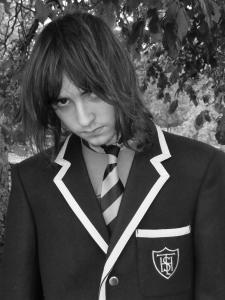
This ambitious venture by the kaleidoscope fringe youth theatre company of Simon Stephen's play raises many issues about contemporary culture and the difficulties facing a disparate, yet privileged bunch of grammar school students as the exam season looms. Sparsely set, with simple chairs and a table, the characters remain on stage for most of the action, and the sense of claustrophobia is palpable. The nervous William Carlisle (a hesitant Milo Waters-the real first night nerves possibly helping to create his characters' awkwardness) struggles to distinguish fact from fiction. His stories are not to be trusted, his lies rarely plausible (programme notes to outline the plot might have been useful to those unaware of the narrative). However, the arrival at college of new student Lily Cahill from Cambridge inspires William to declare his feelings for her, proposing a trip to Lyme Park and exposing his insecurities in the process. A very confident and articulate performance from Ioana Voisei as Lily brings more weight to the intense scenes that needed to be matched. The presence of the confrontational Bennett should also provide for very uncomfortable moments and Alex Brown strived to find the balance of violent unpredictability in the role. Quick paced scenes are intercut with contemporary music to suggest some impending doom or at least a sense of resolution for the sixth-formers. When the final shocking scene arrives - interestingly cross cutting with another scene- the impact of William's fatal actions lose some of its heightened drama. However, this takes nothing away from a competent cast of eight young actors, rising to the challenge of a serious play with serious consequences and largely overcoming them. The questions asked of William provide very little insight into the reasons why people commit brutal acts of violence, simply stating 'because he can'. Other notable performances would be Paul Newby as a bullied and put upon Chadwick, railing against the injustice of his life. These young performers will take much from the experience of acting in a good professional studio, close to the audience with nowhere to hide and approaching the text with maturity and integrity. It's a learning curve that will surely stand them in good stead for future performances. To have a look at the next generation of young actors, catch this brooding, tense play in the next two performances in the Arts Centre Studio.
Jason Hudson
ROMEO & JULIET: AN ALL-FEMALE PRODUCTION by William Shakespeare - Three's Company & Smooth Faced Gentlemen

Right from the opening prologue this versatile cast attacked the language with ferocity and energy. The text was heavily edited to bring the whole play in at 75 minutes (which is never a bad decision with such a well-known play). The skill when cutting Shakespeare is to leave out the extraneous sub plots and focus on the core narrative. This was a slim production that managed to achieve just the right balance.
One of the key successes of this piece was the movement across the space; effortless, simplistic and economical. The cast of seven female actors totally command the small studio space and take genuine ownership of the text. The spoken language was refreshing, dynamic and sharp. An inventive and creative use of the space brought key moments to life, in particular the use of the balcony above the stage to suggest Juliet's tomb and a simple use of a door offstage.
This was truly an ensemble piece of theatre, with some actors taking on two or three significant roles; never easy to single out any one performance, but Ashlea Kaye was quite magnetic as Juliet, finding the right balance between the naïve yet head strong girl opposite an equally impressive performance from Leila Sykes as the doomed Romeo. The female casting of Romeo brought a sensitivity that isn't always evident when played by a male actor and the intimate scenes were played with care. Henri Merriam also worked hard switching between Capulet and Mercutio with ease that reflected discipline and focus. The part of the Nurse is one of the more interesting roles to have fun with (given this is a tragedy) and Fran Binefa played her with magnificent dexterity; vocally secure, physically mischievous and also created some wonderful transitions doubling up as Paris.
Simple settings, a bare stage with two stools and basic costumes worn as codes, the play moved swiftly towards its obvious conclusion. Accents ranged across the board to distinguish the doubling up which on the whole worked to good effect, with a possible exception of the Friar. However, this is a minor quibble in a production that brings out the best in Shakespeare's language; well directed with a genuine awareness of the craft of making theatre, this production set out its agenda from the first line and never let go until the last moment. This hard working cast promised so much and delivered on every count. Anyone who appreciates good quality performance should make their way to the Arts Studio to catch this timeless play.
Jason Hudson
On again 19th, 20th and 21st July Arts Centre Studio
SALOME - REC Theatre Company

Oscar Wilde's 1891 tragedy Salome is a challenging work for any company - an overheated biblical drama where olde worlde language ('verily' and 'peradventure' feature heavily) is used to tell a story of sexual obsession. It labours heavily under Wilde's twin fascinations of love for unattainable beauty (when it was originally banned in Britain, the French translation was undertaken by Wilde's lover, Lord Alfred Douglas), and religious guilt.
It tells the story of Salome, who, spurned in her fascination with the imprisoned Iokanaan (John the Baptist to you and me), persuades her stepfather, Herod (who, in turn is unhealthily fixated on Salome) to have him beheaded.
The REC Theatre Company make a bold stab at bringing this strange and florid drama to the stage. Director Laura Monaghan adopts a naturalistic stance, with Francis Bench's bespectacled, presidential Herod surrounded by a court of black clad officials. He is a strangely diffident, uncertain ruler, governed by his own superstitions, as well as the whims of his wife and daughter. As the wife, Annie Osborne is cast against type as a resentful shrew, sniping at her husband, all blazing eyes and sneering mouth, as if plucked from Who's Afraid Of Virginia Woolf.
In the title role, Ellie Burke is remarkably successful. This being a youth theatre production, the sexual undercurrents of the script have, to some degree, been toned down (something of a - ahem - veil is drawn over the Dance of the Seven Veils). However, it's impossible to get away from the sensuality of the language on display - this is a woman, after all who is supposed to engender such an erotic power that one man kills himself on stage and her stepfather promises her the world in exchange for one dance. This actress finds a truthful connection to the character and conveys her smouldering intensity well.
As I say, the show is given quite a naturalistic production. At times I think the overblown language, with its classical allusions and religious symbolism, could have perhaps called for something a bit more unrestrained, perhaps incorporating the secondary characters into more of a Greek Chorus to convey the imagery in Wilde's play in more of a visual manner and vocal manner.
Still, this is a laudable production of an extremely problematic work and it's a testament to the work of Laura Monaghan and the REC that they have made such an ambitious choice for their Fringe production.
Robbie Carnegie
SAVING GRACE - Rebel Base Productions
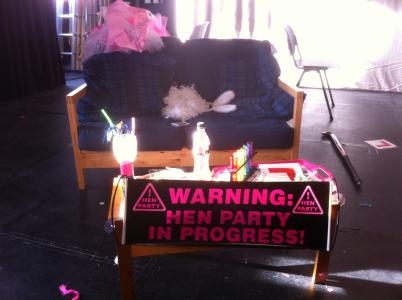
Three friends, Danni, Katie & Cheryl meet up for a relatively low-profile hen party - cocktails, shots and Mamma Mia on the DVD - ahead of Danni's high-profile wedding in Mauritius. However their friend Grace fails to show, apparently because she's got a hot date, but soon the three friends' imaginations are working overtime as they come to believe that something terrible has happened to Grace.
At the heart of this agreeable situation comedy is a neat idea - that in this modern world of constant access via mobiles, facebook etc, when someone drops off the radar, it's as if they've ceased to exist. This is coupled with the self-dramatising quality of a generation raised on OK Magazine and docusoaps, and the sometimes less than constant vagaries of friendship - all three characters profess to be great friends of Grace, but all three would prefer to believe that she's befallen some mishap than that their less socially confident friend should have found romance.
The girls (and the lone male figure who makes an appearance halfway through - I won't give away his identity as it is integral to the plot) are an enjoyable group with which to spend an hour - particularly Josie Sedgwick-Davies as Cheryl, who sustains her character well throughout and captures the OMG! nature of someone addicted to drama in her life. The script has some nice observations, and has many chuckles, even if it sometimes needs a bit more slickness in order to deliver on the real LOL moments.
Robbie Carnegie
SCALLYWAGS - SOOP
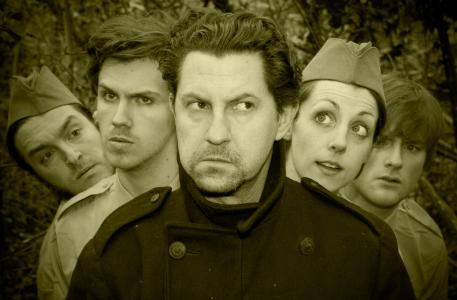
Scallywags is an expertly told hypothetical story of some unlikely underdogs. Trained as Churchill's secret weapon, the Scallywags were Britain's last (and questionable) hope of defeating the invading Boche. Soop Theatre Company go all out with singing, physical theatre and gripping action to bring this epic tale of Britishness to life!
The performance took place in the Pavilion Arts Centre Studio and although there was only a few of us I soon forgot about who was around me as the lights dimmed and the whistle of a Tommy echoed about the room. From then on I was utterly engrossed and intrigued.
Scallywags opens with the catchy theme song which is repeated throughout show, effortlessly performed by the gifted cast of six. Soop Theatre Company use an exciting combination of physical theatre, song, mime and prop manipulation to tell their fast paced tale with care and originality.
The characters are extremely well defined and each with their own internal battles to fight. Relationships are also well formed such as the conflict between the West Country Poacher (Ed Owen Joans) and the toffee-nosed Rupet Billington-Smithe (Phillip Donald). The cast work beautifully together and the performance is a master class in carefully crafted and well-rehearsed theatre. It is hard to point out any specific actors for recognition since the ensemble cast were entirely complicit in their seamless performance and all should be commended.
Soop should also be congratulated on developing such a complex but cleverly woven story. Structurally the narrative took a little while to get off the ground and so with ten minutes to go and no climax reached, when the final crescendo came it felt a little abrupt or underdeveloped. Perhaps the story was a little ambitious, and there were certain moments around the final third of the play that left me feeling a little distanced. I must say the best moments were when the company was doing what they did best, complex and smooth choreography to a simple idea.
There were many memorable moments for example an utterly inspired scene where the actors perform a physical sequence to a piece of 1940's showreel about the role of a Scallywag - It was truly brilliant and charming.
The magic in Scallywags is the company themselves, who have made a show to remember filled with charisma, style and entrancing stage craft. Scallywags is on 6 July 8pm to 9.15, 7 & 9 Jul 10pm to 11.15pm in the Pavilion Arts Centre Studio and is an extremely well told comedy drama, with loads of exciting moments and originality! Jolly good show old bean!
Sian Dudley
SHADOW ON THEIR WALL - Sheepish Productions

The URC on Hardwick Square is fast becoming a key venue for the Fringe, with some excellent theatre on offer there. Shadow on their Wall in the intimate Blue Room is no exception.
Michael awakes suddenly and has to face the consequences of what he has done. He is an intense man, a romantic who idealises his wife, but seems unable to cope with mundane everyday life and unable to always resist the impulses that overwhelm him.
Gareth Watkins puts in a very impressive solo performance as Michael, his imposing presence and confident delivery keeps him well away from the sticky territory of self-pity, an ever-present danger in a one-person show that covers subjects such as depression.
This is fine new writing from JJ Fletcher, it's a very intelligent script, but in a good way, smart enough to recognise that danger and avoid it. At one point, just as Michael is on the verge of over-intellectualising, it neatly punctures that impression. The use of language is superb - as Michael describes his wife, words such as cherish, purest, prettiest, tell us so much more about his own character. There is subtle use made of recurring motifs and circularity in the play that anchors Michael's predicament.
The use of lighting and sound is effective, but some of the stage business is over-complicated. The props are clever, but organising them leads to some long pauses in the dark. The strong central performance is the key to the show and occasionally the props hindered rather than helped.
Between them, writer and actor have created a memorable character in Michael, we all know someone like him, someone who can be great to be around, but difficult to live with and always liable to torpedo their own life. Michael is wonderfully brought to life, and you should go and meet him.
Steve Walker
Shadow on the Wall continues at the URC, 7th, 14th, 15th July at 9pm.
SOMETHING FISHY - Ginny Davis Productions
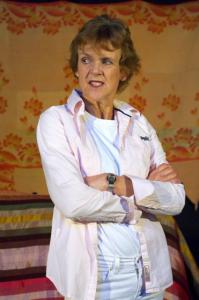
Ginny Davis made a strong impression at last year's Fringe and this was reflected in the good-sized and enthusiastic audience for her return.
Ginny knows her subject and her audience and she tells stories that any parent, grandparent or teenager will recognise. 'Something Fishy' is a new instalment in the life and travails of the Rich family. Ginny takes on all the roles - principally Ruth Rich, mother to Fred (16) and Ellie (17). [Laura is now at uni and is mostly absent doing student politics - I'd like to know more about Laura].
Anyway this time around Fred's behaviour is causing concern - nothing too terrible but his lack of respect for authority is troublesome. Ruth finds herself going to Marrakech as part of a cultural school-trip with Fred, his friend Tim and Tim's sexy, airhead mother.
Predictably disaster is in the air. Ellie is left at home on her own - though Gran is happy to interfere. For Ellie the main problem is when the internet connection is lost. Back in Marrakech Ruth finds herself juggling balls and dropping most of them.
You could say that Ginny Davis' plays are gentle but deliberate satires on the banality and ignorance of white middle-class life in 21st century Britain: the casual racism, the self-centredness - the total disengagement from community life. I'm not sure that that is what she intends - I guess you'll take from it what you want.
What is certain is that Ginny Davis provides a good entertainment - well written and acted with perfect timing. She'll always get a warm welcome at Buxton.
Keith Savage
STARSTRUCK! - BCS Young People's Theatre

This double-bill, performed by the Buxton Community School Young People's Theatre, consists of two plays studying the question of celebrity.
The first play, Totally Over You by Mark Ravenhill, tells the story of four girls (Lydia Tissier, Holly Maddison, Amy Jackson and Natalie Smith) who decide to dump their boyfriends and find celebrity husbands. The boys (Nicholas Layton, Kieran Waller, Zac Aimson and Jack Kent) in turn plan to teach the girls a lesson. The plot is somewhat far-fetched (would the four girls suddenly not recognise the members of the Drama Club they've seen every day?), but it's a funny play and, while Ravenhill's targets are pretty obvious ones, they are nonetheless relevant in these days of instant fame. It also allows lots of opportunities for amusing characterisation, particularly from Ivan Kelly as the nervous lad who embraces role-play more enthusiastically than most.
The second play, The Last Night of Olivia Delaware, is a brand new one, written by one of the members of the YPT, Lilly Posnett. On the evidence of this play, Miss Posnett has a great deal of talent - the play is fluent, literate and engrossing. It tells the story of the death of a film star (Annie Osborne), and, in a series of flashbacks and fantasy scenes, looks back on how her life unravelled. The cast bring this play to the stage with commitment, with notable performances especially from David Cooper as her decent ex-husband and Jay Sullivan as a self-serving writer. Lilly Posnett directs as well as writes and - although her direction is perfectly assured - I'd be interested to see the play again, perhaps directed by someone not so close to it. A director will often be able to bring out the themes which are in a show and shape the raw material - and I also think it would be interesting to see The Last Night of Olivia Delaware performed by a cast of the ages depicted in the play. But this is undoubtedly the debut of a talent to be watched.
Robbie Carnegie
STATUS UPDATE - Fragile Force

This is new comedy writing at its best - cool, funny, fresh, vibrant and refreshing. Written and performed by Fragile Force, a promising and talented cast gathered from the Central School of Speech & Drama.
Buxton Fringe hosted the world premier of Status Update, a re-telling of the classical tale of the underdog in which Mabel and Albert Edwards's Internet Café finds out that real-life competition with Mr Spandangle's Internet Emporium is more of a digital disaster. At first it appears that salvation lies in the rubber-gloved hands of Lisa, the immuno-compromised customer and Jake, the unassuming Business Consultant.
Cats form a significant part in the play and 'coffee breaks' are not what they seem. We learn how things progress online through Mabel's Faceblogging and clever visual interpretation involving Pop-up presentations until the Blue screen of death is written all over struggling Sheila's face.
Life is played out these days in digital dimensions, it is a shadowy world that haunts us from just one click away. Life online can uplift you, involve you and entice you in. But remember that computers age just like dogs (in one year technology advances many times over), so you like Mabel and Albert may not keep up.
The cast of four will undoubtedly appear on a screen close to you in the near future, be that on YouTube, FaceTube, SkyperTube or whatever!! Go and see this fine show in the meantime.
David Carlisle.
THE BALD PRIMA DONNA - AQ Youth Theatre Company

With parody coming out of its ears, The Bald Prima Donna is a polished, well-acted, hilariously entertaining performance, by Aquinas Youth Theatre Company, which dazzled me from the start with its absurd comedy and inanity.
During the opening scene (and indeed throughout) there is some thrilling physical work which sets the style of the piece perfectly. As the clock chimes, our attention becomes focused on the sitting room belonging to Mr and Mrs Smith, played by Jake Martin and Gabbi Monaghan. They are a traditional, middle-class couple who have invited another couple, the Martins, played by Joe Thompson and Ruth Bowler, over for a visit. They are joined later by the Smiths maid, Mary played by Joe McGrath and the local fire chief, played by Georgiana Oddy, who just happens to be Mary's lost lover. The two families engage in whimsical and unconnected meaningless banter, telling stories and relating nonsensical poems, until the play reaches a dramatic climax and events take an unusual turn!
A competent and mature cast immediately rise to the challenge of playing such one-dimensional, generic characters who speak mostly gibberish. It is often difficult to find a cast of actors who are so equally matched, but director Jason Hudson has succeeded in doing just that.
Gabbi Monaghan is magnificent in her portrayal of Mrs Smith and begins by recounting all the things they have eaten that evening to Mr Smith. She then continues to babble on about nothing at all and does so in the most fascinating and entertaining fashion. Jake Martin brings Mr Smith to life in an equally humorous and stuffy middle-class manner, as he reads his paper and relishes being contradictory with his wife, just for the fun of it.
Joe Thompson is also hilarious as Mr Martin, displaying very few opinions of his own and mostly siding with Mr Smith, to the point where the two characters are completely interchangeable. Ruth Bowler, as Mrs Martin, superbly delivers the tale of the man leaning forwards and tying his shoelaces, much to the delight of her companions, who see this as a wonderful and entertaining tale. The Martins make a slick double act as they initially cannot remember exactly how they know each other and a comical process of elimination begins. The great doorbell debate between the Smiths and Martins had me laughing uncontrollably, along with other members of the audience.
Joe McGrath is superb in his portray of the pushy maid, Mary, who doesn't seem to know her place when she scolds the Martins for being late, literally throws herself at the fireman and although she isn't 'respectable' recites poetry in the presence of the Smiths and their guests. Georgiana Oddy is equally impressive as the Fire Chief (perhaps the most complex character in the play) and takes the absurdity again to another level.
It is thrilling watching all of the characters moving swiftly and effortlessly around a table and four chairs eyeing each other cautiously in the hope of occupying a vacant seat. Once the Fire Chief mentions 'The Bald Prima Donna', the entire play becomes crazier and crazier and has the cast spouting random non-sequiturs until the clock strikes (time is all messed up in the Smiths house) and the play begins again, only with a twist which is completely plausible.
Each six actors offer a slick, unfaltering performance throughout (even after the bows) with crisp, impeccable timing and continuous comical gesticulation, which is worthy of a professional company.
Who knows, maybe there is a little of the Smiths and the Martins in all of us (although we would rather not admit it) well, at times at least. Whatever the case, you'll have tons of laughs at this hilarious performance, by a group of incredibly talented young people. One thing is for sure, the characters in the play may not be deep thinkers, but this performance certainly encourages its audience to be. Bravo! Bravo!
Catch them at the United Reform Church, on Sat 14th at 5.30pm, 7pm and Sun 15th at 3.30pm, 5.30pm and 7pm.
Joanne Eltringham
THE MOTH - Peak Stage And Film

In this ambitious new play, consumptive archaeologist Maxim and his beautiful wife, Anna decamp from Belle Epoque Paris to colonial Algeria, where Maxim falls under the influence of the sinister Emil and begins to indulge his lusts for alcohol and young boys, in a hedonistic descent that will drag his whole life down with him.
The Moth is something of a curiosity. A 19th century-style French melodrama, delivered by a youth theatre cast in a modern idiom. Jill Alexander's writing seems to draw on many literary ancestors - Madame Bovary, Tennessee Williams' Suddenly Last Summer, even Tess of the d'Urbervilles. It carries on its shoulder the weight of a number of big themes: the evils of colonialism, Catholic and Islamic devotion, class divisions and duty (whether to marriage or country). It's a lot of weight to put on the shoulders of a young cast and sometimes it gets the better of them. However, hats off to Epiphany Alexander, whose energetic, sympathetic performance keeps the show moving. She manages to bring a genuinely Gallic passion to the part, moving from being a slightly silly girl at the beginning to a devoted nurse to her ailing husband, to a woman broken down by circumstance.
The Moth is a long play (in its late-night first performance it didn't finish until nearly 11.30pm), made, it has to be said, longer by its many set changes. Although they were accompanied by atmospheric photos and original music, I think it might have been preferable to find some way to simplify the staging, so that the scenes moved more seamlessly from one to the next. Also (and I would advise this to any group using the Arts Centre, as this is the second show where I've seen it cause problems), take some time to get acquainted with the geography of the space, so that it's clear where the curtains end and where the solid flats begin.
All in all, The Moth is a commendable effort by all concerned, staged and performed with sincerity and commitment, a bold experiment that avoids trendy modernism in favour of an older form of drama and, although it doesn't entirely come off, has to be admired for its audacity.
Robbie Carnegie
THE OVERCOAT - Le Mot Juste
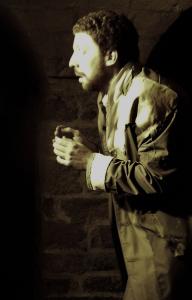
Gogol's classic short story is only thirty pages long so I wondered how Le Mot Juste could manage to fill an hour's worth of theatre with it. That they have done so very successfully is a tribute to their ingenuity.
Akaky Akakievich is a nonentity working for the Russian civil service copying official documents. Nothing matters for him except his beloved copying, but when his decrepit overcoat finally falls apart in the harsh weather, he becomes obsessed by getting a new one.
The company make excellent use of physical theatre techniques to tell Akaky's story. The precise movements as he does his copying work are echoed by the other two cast members to lend emphasis and there's a subtle shift into more flowing movement as he loses himself in his work. Jon Levin captures Akaky's nerdish precise nature, but also his awkward pride as his smart new overcoat causes a transformation in his social standing. Ben Hadley (last seen here in Three's Company's Reverie) and Rachel Lincoln (another Fringe veteran with Fat Content) play a host of other characters with fun and verve whilst managing the stage business with style. The simple set is moved around effectively and the scene changes flow so well you barely realise they are happening. There are some delightful touches; the box where Akaky keeps his money, the way a wall leans to create a cramped feeling in his flat, and the clever use of the overcoat itself.
Music is provided by a guitarist (Charlie Davies) on stage which allows some nice interaction and a 'live' feel not possible with a soundtrack. The additions to Gogol's story could be a weakness but they complement it nicely. There is some great fun with the cat hunt, and a tender relationship between Akaky and his landlady that brought some warmth to him that a stage version may not have worked without.
I wasn't so sure about the surreal scene with the czarina and Akaky, and the rather wonderfully grotesque tailor was somewhat let down by his modern colloquialisms that felt out of place in the otherwise very Russian feel, but there is very little that jars in a performance that elicited plenty of chuckling from a happy audience.
The use of physical theatre has been a feature of this Fringe, but this was one of the few occasions when it's been used in service of the story telling rather than as an opportunity to show off. Well worth an hour of your time on the last Saturday of the Fringe - 21st at 6pm in the Arts Centre Studio.
Steve Walker
THE SECRET RAPTURE - Be-A-Tree Productions

David Hare's 1988 play, The Secret Rapture, deals with middle-aged family relationships against the backdrop of Thatcherite Britain. In the past it's starred such notables as Penelope Wilton, Juliet Stevenson and Joanne Whalley. Not perhaps the obvious choice, then, to be performed by school-age actors as part of the Year 13 Btec Performing Arts (Acting) class. However, it is to the young actors credit that they carry this ambitious project off remarkably well.
The play is predominantly a character study of three women, and each of them is well developed in the subtle and mature performances on display. Katie Collins plays Marion, a Junior Minister in the Thatcher Government, making her brittle, neurotic and self-serving, but with a hint of vulnerability underneath. In what is possibly the hardest role, Holly Friend plays Isobel - it's very hard to play a thoroughly decent, good person, without making her priggish or martyred but Holly manages this feat, underplaying the role with a matter-of-fact simplicity. As their young, alcoholic stepmother, Katherine, Cariad Fiddy conveys a volatile, childish woman with an odd serenity, but with her broad smile hinting all the time of a predator about to tear up the worlds of those around her.
Jack Ashcroft, a late addition to the cast, plays Irwin, Isobel's business and romantic partner well, and the scene in which their relationship dissolves was handled with great sensitivity and maturity by both actors.
The staging is simple but effective, showcasing the performances rather than dominating the proceedings. Perhaps a little more time could have been given to creating the sense of period (beyond the Human League/Duran Duran music as the audience came in), but that's a small point. Overall this was a remarkably assured performance of a play that is full of complicated family relationships. It's certainly well worth the trip to the Community School to see it.
Robbie Carnegie
THE STRANGE CASE OF DR JEKYLL - Uproot Theatre Company
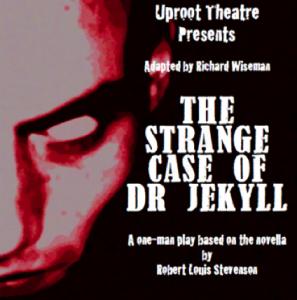
As one who has always been intrigued by the idea of how 'personalities' can affect human behaviour and that an alter-ego can hide behind one's polite facade, I was very much looking forward to watching this one man play based on the classic Victorian horror story by Robert Louis Stevenson. As I approached the venue, I felt it would perhaps be a challenging task to present alone, so I was curious to find out how one man would do it. I have to say, Dr Henry Jekyll/ Edward Hyde, played by Jamie Robertson, was totally mesmerising, his gripping tense performance had me hanging on his every word and perched on the edge of my seat throughout!
The audience enters to a darkened room where we feast our eyes upon an upturned arm chair, a mirrored dresser and papers that lie in disarray across the floor. This scene is accompanied by dark, sinister gothic style music, which immediately sets the tone and creates a percolating sense of dread and impending doom.
Jamie Robertson's portrayal of the respectable, morally decent (but mentally unstable) Dr Jekyll is superb throughout. He skilfully encourages the audience to empathise with the hideously unbearable position he finds himself in (even though ultimately Jekyll is responsible for Hyde's actions) when his ultimate intention was that his scientific experiments were to help, not hurt mankind. The production begins as Jekyll is writing his confession and we discover the dreadful sequence of events that have led to his final hours.
Jamie's transformation from Dr Jekyll into Hyde is brilliantly terrifying in its subtlety, as we witness bit by bit the violent monster slowly gaining control. The audience watches in horror as Jekyll struggles with all his strength to keep hold of his better self, until the realisation that this being of deformity, decay and pure evil will not release his grip until he gains ultimate domination.
The simple use of props, lighting and sound created the perfect atmosphere to accompany this piece, without distracting us from the real mastery of Jamie's commanding and faultless performance. Important details of the plot were cleverly weaved into the storytelling, such as the dramatic beating to death of Sir Danvers Carew, using only a cane and an armchair. Following a manhunt, Jekyll sets about trying to rid himself of the evil inside him, but by this time Hyde has become an irrevocable part of Jekyll's character, and the many transformations and evil behaviours only strengthened his power. The death scene is equally spellbinding as both Dr Jekyll and Mr Hyde are finally set free.
It was indeed a privilege to watch such a captivating piece of theatre, performed by an inspiring and remarkable actor, whose name I am sure we will all come to know!
So, if you are in search of a chillingly accomplished, dread-inducing tale, catch, 'The Strange Case of Dr Jekyll', being performed on the 17, 18 and 21 July at Underground Venues. Gripping Stuff!
Joanne Eltringham
THE TRANSIT OF VENUS - Cul-de-sac theatre

Set in the troubled year of 1639 just before the outbreak of the English Civil War, mathematician and astronomer Jeremiah Horrocks, a student of Emmanuel College, Cambridge living in the Lancashire town of Much Hoole, introduces himself to William Crabtree, a merchant and amateur astronomer from the Manchester suburb, Lower Broughton.
They became good friends and a romance develops between Horrocks and Crabtree's daughter Jenny. The focus of all their interest was the transit of Venus (predicted by Horrocks) to be on November 24th of that year (Julian calendar then in use in England). This was the first scientific observation of the event which was not just an astronomical spectacle, it ultimately provided the means to measure distances which helped map out the solar system.
This drama incorporates the conflicts between mathematics and science with the range of religious beliefs of the day and the political war between parliament and the monarchy. Witch trials were still conducted by the Catholics, there was a rise in liberal peace groups but also a strengthening of fundamental Puritans and the rise of the Quakers. It was the beginning of the Age of Enlightenment. A truly complicated environment in which to tell a story!
"Mathematics gives us the only certainty", says Horrocks, "outside of scripture! ..... God speaks to me directly through the divinity of numbers."
I think the play makes an ideal educational tool to provide context for history classes but as a serious drama it lacks depth in its characters and the relationships between them. For me, it is important that characters are not just understood but also felt. There was a moment when I began to care about Horrocks with his shyness and enthusiasm but it wasn't sustained.
If you are a secondary school teacher, I strongly recommend you take the time to watch this. It is on again 17th and 18th July at 7:30pm in the United Reform Church, Hardwick Square East. Visit them online at http://www.facebook.com/events/297894716974070/
Martin Wood
THIS WAS YOUR LIFE - Quite Nice Theatre

This young and energetic theatre company produce a fast paced, comedy full of quick changes and presenting a wide range of characters brought to life by the talented cast of 3.
From the moment you arrive you are involved as a studio audience in a live TV broadcast of, "This was your life" where witnesses are brought to the stage to inform the audience decision on whether the "deceased", Michael, is going to heaven or to hell. It is a kind of updated version of "A matter of life or death" (just me then?!) where David Niven's life is up for grabs.
A stream of witnesses arrive with the highlight being the seductive, if a little hairy, Fraulein Mimi who proves to be too much temptation for Michael and so the evidence mounts up against him. A rapping grandfather and irate Chip Shop owner add fuel to the fire, leading to the audience decision to send Michael to fiery damnation or to heaven.
The concept is the logical afterlife extension of today's reality TV and uses the same cynical ploys to get the result the producers want. There is no interest in arriving at a balanced view and in the gaps between the live broadcast, where guards are down, the "techies" reveal insights into their true intentions.
Quite Nice Theatre's cast of Gavin Moore, Marina Waters and Will Guppy bring an enthusiastic and engaging spirit to the performance involving the audience throughout and delivering a smart set of original songs to push the narrative along. A very enjoyable experience!
Paul Harrison
UNDATEABLE - Yvonne Lake

After a couple of cancelled performances, Yvonne Lake's one-woman show, Undateable finally took to the Hydro Tearooms last night. This is Fringe theatre at its most fringey, not so much in its content, as in its location. In some respects companies performing in a managed venue have it easy - theatre-style conditions, lighting, blackouts - all of these were lacking here, but that in a way makes the experience more intimate and exciting, although in the case of this show caused a few fundamental issues.
Unateable takes the form of a video lecture by a lecturer who takes us through the history of courtship rituals (some real, some silly), through which are laced four characters whose online dating attempts are performed, live by Ms Lake. The lack of blackout meant that the onscreen presence was not always as visible as it might have been, and the transitions between the four characters sometimes more visible than they might have been, but as I say, that added to the organic nature of the show, taking away from what might have been the cold technicality of the video inserts.
Ms Lake shows versatility in her portrayals of the five characters: the onscreen lecturer (with a penchant for stone age men), a shy woman who has taken to wearing a veil, an evangelical maternity nurse, a predatory pregnant woman and a middle-aged multiple widow. All the characters are well delineated, and all come across as damaged women, searching vainly for love. The show treads a line between dramatic monologue and character comedy, although at times some of the comedy was a little on the broad side for my tastes.
I think it's probably fair to say that the show is still a bit of a work in progress (the cancelled early performances would suggest that there were issues that needed to be ironed out). That said, it's a courageous performance and one to be applauded.
Robbie Carnegie
VIOLET'S SILENT SCREAM - Incontinence Theatre Company

On my arrival at the Burbage Institute for the performance of Violet's Silent Scream, I was greeted by a kindly nurse selling tickets and urging me to use some hand sanitizer. She drew my attention to a sign containing a list of warnings about the content of the show I was about to see, and the final words: 'The show will be deemed to have started from the moment you enter the auditorium'. Here we go, I thought. In the words of Stingray, Anything could happen in the next half hour. I along with the rest of the audience sat slightly ill at ease, waiting for someone to jump out at us, but in fact we were left pretty much alone, watching a girl lying unconscious in a hospital bed.
The girl is Violet (Tegwyn Holman), in a coma after an apparent suicide attempt. As the play unfolds like the origami boxes that we are given in lieu of a programme, we uncover the web of relationships that have led her to this point, particular that with her warring, estranged parents (a somewhat mismatched Ioana Voisei and Printz). To her bedside also come a prostitute and a policeman, to whom, it transpires, Violet is connected rather more than is healthy.
The play, written and directed by Ms Holman and Shanna Griffin, moves between reality and fantasy as the unconscious Violet processes the events of her life, something not always helped by awkward cross-cutting between scenes and, in one scene at least, background music that was so loud as to completely drown out the actors. Overall, Violet's Silent Scream creates an intense atmosphere, not least in the central performance of the disturbed girl, but overall sometimes struggles to hold together all the ideas that are buzzing around it.
Robbie Carnegie
WHAT MAN DARE - Re:Conception Theatre

It's ambitious to attempt to answer the question "what does it mean to be a man" in just under one hour. Philosophers have been asking this for thousands of years and we (men and women) still have no definitive answer. Still, this doesn't stop this young troupe from having a go.
Taking in a range of influences, sources and media from anthropology to prose, the work gives us a glimpse into some of the aspects of manhood currently under the microscope. They offer us dichotomies of identity which men, and perhaps women too, attempt to juggle and balance in our lives. Loving father, violent aggressor, teacher, friend - all surface in this piece as images of men and man. Whilst not wishing to be patronising by making a reference to age as they mentioned, it was interesting to see that they moved seamlessly from playing golf to old age - this could only be imagined by non-golf playing young men I think!
The asking of the question relies of course on a strong sense of self-reflection and I'm not sure how this can be reconciled with what seems to be an increasingly unreflective society in which we live. Is this piece of theatre a product of post-modern, post-university angst, I think I would have to say yes. The work is intense and focussed, and combines elements of acting, dance and music. I thought at times there was rather too much going on for example, I found it difficult to listen to two actors speaking simultaneously and Elbow playing in the background.
If asked to review this in one word I'd say earnest. If you want to see and hear how the debate on manhood is progressing then this is one to watch.
Ian Parker Heath
WINSTON ON THE RUN - Fol Espoir

Written and Performed by Freddie Machin - Directed by John Walton
It's 1899 and the young, red haired, Winston Spencer Churchill is on the run in South Africa. Having escaped imprisonment by the Boers, he is now hiding at the bottom of a coal mine waiting for a lift to arrive from the surface which will lead either to his freedom or his recapture by Boer. But this frightened young man with "Rats and dark thoughts, his only company" has a third option; he can choose to light his last cigar, knowing that it will probably ignite the methane in the air taking his own life and those of his enemies. "Death in battle is man's most noble fate".
Rising above his fear, he makes a deal with the rats, that if they keep their distance he will tell them his story. And so, the young Winston engages the audience telling of the incidents and accidents which preceded this predicament. (From a failed Oldham by-election to his current job as a newspaper war correspondent).
There are two major aspects of this production which, for me, make this drama so deserving of merit. The first is the script. It's clear that much research was done, collecting opinions, writings and quotes, not just from Churchill's early years but from the later years too. (The "ten ideas a day" reference is from a quote by Clement Attlee).
The script creates an image of a jovial, reckless, young man, with fears, aspirations; a boisterous leader with a bravado attitude, a keen and fluent writer. His relationship with his father was an important part of who Winston became. His father was always very critical of him as he grew up. He died when Winston was only 20 years old.
"Winston, having just escaped the Boers, is sitting under a tree, shaded from the blistering sun. He sees a vulture perched on the top of the tree, waiting his demise. Pause. Winston recalls a story of his critical father. "
But having a well crafted script is not enough; a good production needs an actor who can bring the script to life. And who better than the writer himself!
Freddie Machin charms the audience and engages with them. He introduces us to the young Winston; with his boisterousness and arrogance ("I am the son of a lord you know"); but also shows his sadness and vulnerability; and, importantly, his courage in solitude. We were convinced and were with him all the way.
I don't know whether the image of Churchill in this drama is an accurate portrayal. My, own, personal picture of him is that of a water colour painter, desperately trying to forget the war and his order to bomb Dresden which resulted in the death of 750,000 people. But strangely, this performance, tempered my view, seeing him as a retired overweight gent, sitting, drinking tea at the Reid's Palace Hotel.
What's important here, is the person created in this drama, Machin's Winston Churchill is an inspirational character and seeing him in his youth makes him more accessible. Although privileged, he was as vulnerable as the rest of us and therefore so much more worthy, given his achievements.
A drama, well written, constructed and performed. The most engaging theatre I've seen this year.
Martin Wood
WORDS FROM THE VOID - Stephen Wymark

As we entered the upstairs room of the Methodist Church hall we were met with seven chairs placed in a circle facing inwards. I naturally went to sit down, when a voice from the corner questioned "What are you doing?" clearly not the normal audience set up then. As we were led over to the corner of the room, we stood and listened to a man tell reflect on his past and weave the beginning of a story.
As we moved over to the chairs (which we were now allowed to sit on) we learned more of this character, and the other characters which inhabited his mind, life or imagination. Wymark filled the room with personalities, metaphors, memories and questions.
The story is hard to explain. In fact it is hard to hear, which I'm sure is the intention because throughout the show we were asked "Do you understand? Do you see what I'm getting at? Do you know what I mean?"
We were trapped by eye contact from the beginning of the show, which led to some confusion as to the role of the audience and the type of performance it was. Apparently there were rules and normal audience boundaries were established pretty quickly.
Wymark uses repetition and rhyme in the creation of this fast paced text which has clearly a complex piece of theatre. The show became more performance poetry by the end and the audience were left to draw their own conclusions of the play's meaning. Although the narrative was unclear the feel of the piece was energetic and frightening. Wymark's intensity was piercing throughout and the close proximity from audience to performer gave a sense of danger and unease.
Words from the Void is an intimate and intense experience mixing truth with lies in a cocktail of uncertainty. Wymark has created a truly original piece of performance poetry.
Sian Dudley
WWW DOT - Top Hats Off
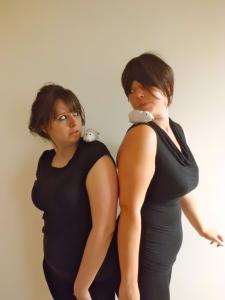
Curiosity drove me to review this new show. It sounded like it was going to be an interesting adventure and it is free, yes that's right free! It took the audience a while to work out where the Blue Room was, posters and arrows are needed here as people could have been easily lost to the show in the other room. Once in, an intriguing sight met our eyes, seats with goodie bags, a giant top hat and a small pair of black curtains in the centre of the space.
Tilly Mac and Sally Turton have spent a month and a half putting together this two handed, work in progress, which gently pokes fun at the internet. We see Lucy (Sally Turton) trying to improve her social life through using Facebook (Tilly Mac), oh yes Facebook was a person, as was Ms Google who was made to look a little bit old fashioned by new kid on the block MC Bing with her rap and bling microphone .
The props are very homemade, as are the cookies, which are consumed by the actors at many opportunities in the show. The audience even get cookies in their home made goodie bag. Cookies are ever present, as in real computers. Cookies need to be destroyed/eaten...often. Can't argue with that!
Synchronicity within the physical side of the piece could be worked upon. I am guessing the props are working props that will be improved for the final product. Interaction with the audience was enough to be entertaining but without feeling uncomfortable. We got to bid in an eBay auction; I bought a beard which I think got sent to China, a computer error apparently.
WWW Dot is a show that needs to be delivered with more confidence; it may be a work in progress but really sell it. It is an hour of low tech daftness, the odd bit of smut and of course cookies.
Jayne Marling
12th&13th July 7.30-8.30 IT IS FREE United Reform Church. Blue Room (round to the right)
YOUNG HEARTS - Resonating Theatre Works
Illness in the cast prevented the first performance, originally scheduled for the 19th, from going ahead and it may also have had something to do with the story turning into one man's struggle with Alzheimer's rather than one woman's, as stated in the programme.
No matter, this cruel disease is unisex and non-discriminatory in every way making it relevant to just about all of us. We meet George (Robert Throup) in a backroom within a backroom downstairs at the Methodist Church. The confined space is ideal to convey George's cluttered sitting room and we have to move old newspapers off chairs to sit down round the edges of the room. Not much happens most of the time. George shuffles around packing the odd thing into a case - treasured objects we feel - and lights up when listening to Frank Sinatra's The Way You Look Tonight on the radio. Occasionally he calls for Mary, whom we assume is long dead. At intervals, a man appears and settles him down in his chair to watch Countdown. Benign as he seems in his conversation, he is wearing a black balaclava. Another visitor arrives - the doctor (Matthew Barlow) there to ask him 'a few simple questions', which of course are anything but if you have Alzheimer's. In a rare flash of humour for the play, George's delayed reaction to the question 'Who is the prime minister' results in him describing a picture of an umbrella as David Cameron.
George mooches about some more, confusedly hiding some pills and wrestling with his scarf as he contemplates going outside but does not get further than the door. The carer, if this is who he is, makes more visits, his tidying up gradually extending to lugging whole pieces of furniture away. Here's where I thought the play became really interesting. George is getting agitated and we don't know any more than he does, quite what is going on...
Resonating Theatre Works have done well to draw us into the mind of somebody with George's disease and the balaclava is a fascinating touch - George doesn't seem threatened by it so on the one hand it could just be suggesting the facelessness of all carers as far as he is concerned. On the other hand, the balaclava helps to create a distinct atmosphere of unease, especially when George's possessions start disappearing.
I wouldn't want to give away the ending but there is a touching resolution. Devised by Robert Throup this is a nicely performed, sensitive production that is thought-provoking yet leaves us wanting more. Promising work indeed.
Stephanie Billen